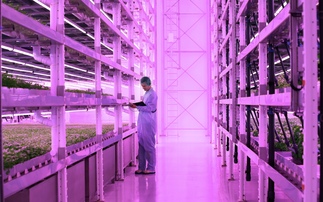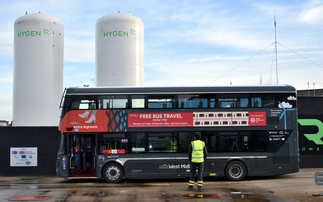James Murray's speech to the second annual BusinessGreen Technology Awards
Ladies and gentlemen, welcome to the second annual BusinessGreen Technology Awards.
I would like to begin this afternoon's proceedings by extending a heartfelt thank you.
Thank you for joining us here today at the Institution of Engineering and Technology.
And thank you for supporting these awards.
It is a reality of the modern media landscape that BusinessGreen would not be able to provide you with the news and analysis you make use of every day without your support as subscribers and successful events such as this, so thank you.
But most all, thank you for cheering me up.
Let me explain.
Through a combination of poor diary management and the erroneous belief it would be a quiet news day from an environmental perspective, the judging session for this year's awards started a few hours after Donald Trump won Florida.
I don't think I'd be talking out of school to reveal our panel of clean tech experts were less than enamoured with the news.
To be honest, I've been to cheerier wakes.
A racist, sexist, vulgarian had been elected to the White House, and he had vowed to bring with him an authoritarian tendency and a level of scientific understanding that would shame a kindergarten class.
The only way it could have been worse is if he had appointed a bunch of climate sceptics and coal industry lobbyists to his transition team.
Which, of course, he promptly did.
The climate strategy of the world's most powerful economy is now being plotted by a bunch of people who don't think climate change is happening.
It is like putting James Delingpole in charge of Friends of the Earth.
It is like putting Hannibal Lecter in charge of a vegetarian restaurant.
It is like putting Donald Trump in charge of a nuclear arsenal, which, again, they've just done.
Suffice to say, the mood at the start of the judging day was not great.
'Who died?' you might ask if you walked into the room. 'The enlightenment, liberalism, and hopes of maintaining a habitable biosphere,' would be the entirely reasonable response.
But then we started to discuss your entries to these awards.
And I would defy anyone to stay pessimistic for too long when looking at the companies, innovators, and entrepreneurs represented in this room.
Across buildings, and transport, and industry, and cities, and energy, and agriculture, and pretty much every sphere that makes up the modern world the progress being made by you and your peers is absolutely awe-inspiring.
In virtually every single clean tech sector, costs are falling, deployments are accelerating, viability is bring proven, and even more exciting next generation technologies are in development.
Almost every government and every major business on the planet has accepted that genuinely sustainable development is the only economic path forward.
And they have recognised this inspiring reality because the technology innovations delivered by you and your peers have shown how sustainable development is not only environmentally essential, but highly desirable.
For that alone every single one of our finalists today deserves to be congratulated.
And that is even before you consider how you all beat many other companies to make it onto our shortlist for this afternoon's awards.
Please join me in raising a glass in congratulations to all of our BusinessGreen Technology Awards Finalists.
Now, I understand that after the past 12 month anyone operating in the green economy faces considerable challenges, including a great big orange one in the White House.
When we launched these awards a year ago most within the UK clean tech sector would have said, 'secure the Paris Agreement, get the Brexit referendum out the way without too much turbulence, and watch a new US president get elected on the greenest platform ever proposed' and the industry will be well set for another great year.
Well, it didn't quite pan out that way.
And as we look forward to 2017, with the lesser spotted Brexit plan still a figment of Boris Johnson's imagination and Donald Trump considering selling off the White House lawn to fracking developers, you would be forgiven for turning to the infamous words of Albanian dictator Enver Hoxha: "This year will be harder than last year. On the other hand, it will be easier than next year."
Jeremy Corbyn got in trouble for using that quote a short while back. The Telegraph accused him of supporting a socialist dictator, which in fairness does sound like something he'd do.
But I'd argue given the current climate we would all do well to study the collected quotes of totalitarian Eastern European demagogues in the coming months. Just a handy tip for you there. It's good to be prepared.
But we must not succumb to this pessimism. It is vital that we challenge this depressing outlook and harness the optimism that defines the green economy at every turn.
As such it is critically important to remember three crucial characteristics of the clean tech sector - characteristics which are embodied by all of you here today.
Firstly, the pace of technology change is outstripping all expectations.
Every year the International Energy Agency has to upgrade its projections for the deployment of clean energy technologies. The electric vehicle market is starting to deliver on its early promise. And the collapse in the cost of renewables over the past decade has surprised virtually every analyst and investor.
Ten years ago I was an IT journalist writing about what was then known as Business Intelligence software.
The premise was simple: the breakneck acceleration in computing power and data storage would enable businesses to analyse data in virtually real time, providing insight into customer behaviour and corporate performance that would transform the way firms interact with customers, employees and suppliers.
In the ensuing decade, Business Intelligence morphed into analytics and then Big Data and then the Internet of Things, and now countless variations of the word smart.
The technology that we thought was exciting when it could tell you that if you bought one book you might like another (for example, if you bought Donald Trump's the Art of the Deal you should perhaps check out history books about the 1930s). That technology can now tell us where to park our electric car to recharge it from renewable power while automatically optimising the heating of our home and office.
Imagine where we will be in another decade.
Except we don't have to imagine that hard. Tesla's Elon Musk, and many others, including many of you here today, have a vision of integrated clean energy, storage, electric cars, and public transport that will make our economies clean and ultra-low carbon. It could happen a lot faster than we think.
Secondly, the policy landscape in support of clean technologies is still remarkably robust - if you had to pick the one result you would want from the Paris Summit, the EU referendum, and the US election you would take the agreement that was delivered in Paris as your first choice. Next year the UK policy landscape will get better still with the introduction of the country's new emissions reduction plan.
Moreover, the policy landscape is not the sole driver behind the clean tech progress you and others are making.
Regardless of political whim people will always want clean air, clean water, attractive technologies, resource security, and a stable climate. That's not going to change.
To illustrate the point just consider what has happened in the couple of weeks since the US election.
The UK, France, Canada, and Finland all revealed plans to phase out coal power.
Jaguar Land Rover, BMW, VW and Toyota all unveiled plans to expand their electric vehicle ranges.
BNP Paribas launched its first green bond.
Tesco agreed to end the use of microbeads in its products.
An island in America Samoa went 100 per cent renewable powered.
The UK government announced new funding for electric vehicles and clean energy.
It was confirmed Buckingham Palace is to get an AD unit and some solar panels.
The first 8MW wind turbine from the Burbo Bank extension offshore wind farm started delivering power.
This list goes on and on.
General Motors and Microsoft both signed massive new wind power purchasing deals.
Tesla completed its acquisition of SolarCity.
The MeyGen tidal energy project generated power for the first time.
US sustainable investments rose 33 per cent to $8.7tr.
Germany revealed plans to cut emissions 95 per cent by 2050.
And every government in the world reiterated their support for the goals of the Paris Agreement.
The momentum behind this global revolution is unstoppable.
Finally, and perhaps most importantly, the clean technologies you are delivering have the potential to solve not just the environmental crisis we all face, but some of the wider inter-locking crises that have marred 2016.
Without wishing to end on too much of a downer on an afternoon that is all about celebrating the best in clean technology, we live in worrying times, and yet I fear one of the problems is we are still not worried enough.
The forces of populism and authoritarianism are on the march, fed by legitimate grievances at the governance and economic mis-steps that have become painfully apparent since the 2008 crash.
Old certainties are in retreat, along with the enlightenment values of liberalism, reason, and environmental responsibility.
But there are already signs the fightback has begun and a growing understanding that if democrats and liberals and centrists of all stripes are to challenge the new authoritarians they need a new narrative.
And at the heart of that new narrative will inevitably sit all the things clean technologies can inherently offer - security; good, rewarding, localised jobs; healthy communities in pristine environments; innovation and excitement.
And most important of all, a positive vision of the future - a peaceful, prosperous vision, which we can all unite behind, because it is in everyone's best interests to do so.
When push comes to shove, human beings are pretty fond of the natural world that sustains them - there is no mandate for dirty air and water.
It is that reality, that pent up demand for a better and cleaner way of running our economies, that provides the clean tech sector - provides all of you - with an epoch-defining opportunity. It is an opportunity that the new authoritarians in the White House and elsewhere will not be able to crush, as hard as they may try.
You thought as clean tech innovators it was your job to help save the world from the immense environmental challenges it faces - after the past year it turns out the challenge, and the opportunity, is even greater than that.
So thank you.
Thank you to the exceptional team at BusinessGreen whose work you read everyday, who help keep you informed, and helped deliver these awards.
Thank you to our judges, who I hope shared my sense of optimism at assessing all of our wonderful finalists.
Thank you, of course, to our sponsors Innovate UK and Withers Rogers, without whom this event would not be possible.
And thank you to all of you. The work you do is even more important than you realise.
James Murray is editor-in-chief at BusinessGreen










